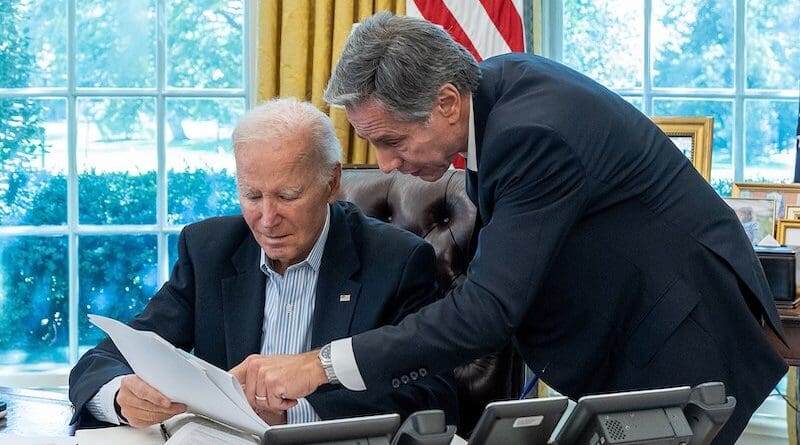Zigzagism: Understanding US Foreign Policy – OpEd
The United States has been struggling to find a consistent and coherent foreign policy for many years. It has failed to contain the fundamentalist groups such as Al-Qaeda, ISIS, Jabhat al-Nusra and dozens of other terrorist organizations that have spread violence and instability in the Middle East and beyond.
Now, the US foreign policy has shifted its focus to containing China and confronting Russia militarily. This shift comes at a time when the US has not been able to resolve the insecurity and cold peace in the Middle East and is mired in multiple conflicts of its own making. However, history has shown that Americans often try all the wrong ways before they find the right solution. This is reflected in Hollywood’s spy and thriller films which have pursued a consistent agenda for years. The typical villain is a Russian or someone of Russian origin who wants to destroy the world and disrupt global peace and harmony, reminiscent of the modern and postmodern Dr. Strangelove. The Americans are the heroes who uncover these plots and save the world. This narrative has been the common denominator of the American mission in a world that is still caught between the new international order and the Cold War order. It is likely that we will soon see the emergence of Chinese intelligence agents as the new antagonists in these films.
Aside from macro strategies, the US has also experienced a zigzag policy in micro strategies. The current situation and reaction regarding Gaza and the war in Ukraine reveal a part of this indecisive zigzag movement in American foreign policy. Zigzagism is a foreign policy approach that lacks coherence or consistency, or that only pretends to have a clear direction for the sake of appearance or propaganda, so that the world believes there is a plan and a grand order. However, this zigzag movement indicates the fragmentation of American foreign policy, which is more evident than ever in the security crises and chaos in the global security structure. Zigzagism behaves like a drunken creature who sways from left to right, and if he gets behind the wheel, he inevitably crashes into a hard wall.
For instance, the war in Ukraine has exposed the Republicans’ strong opposition to more aid to Ukraine, their change of the congressional leadership, and their pessimism about Ukraine’s future. Meanwhile, their double-standard policy does not pressure Israel and Palestine to cease fire and pursue a two-state solution, but rather fuels the war by providing massive military equipment and aid. The democrats’ claim that the two-state plan will end the conflict is also unrealistic, as the negotiation between the oppressor and the oppressed will not create equal conditions for a satisfactory solution. The war between Israel and Hamas has also revealed the split among the democrats. Many young democrats, progressives, Arab Americans and other minorities accuse the government of applying a double standard in supporting Ukraine against Russia and Israel against Hamas. Only a few people trust that the government’s actions will lead to a peaceful solution. The president’s stance on Israel has increased the divisions within the Democratic Party and lowered the overall approval of Biden among all parties and age groups.
The other aspect of zigzagism is the rise of indecision and resistance to peace terms in foreign policy. The Americans have practiced what can be called “veto diplomacy”. While the world seeks some form of solidarity to resolve the ongoing crises and wars, the Americans have blocked the implementation of the UN General Assembly’s decision in the Security Council. For instance, in the recent case, the United States dismissed the special article 99 that the Secretary General of the United Nations, Anthony Guterres, activated to convene the Security Council as soon as possible (an article that has been activated only nine times). Vetoing in the current situation is tantamount to creating a crisis for the world, whose order, according to the Americans, should be governed by chaos.
Chaos is the code name of the current world, which began with the 2001 and 2003 invasions of Afghanistan and Iraq in the early 21st century. These events showed us that peace and stability in the world are nothing but a childish dream. This was confirmed by the surrender of Afghanistan to the Taliban after two decades, which demonstrated to the world that democracy and human rights are just empty words for the Americans, who use them to justify an order that they define by their own interests, friends, enemies, wars, peaces, sanctions, and incentives. The rest of the actors have no value for this veto diplomacy, which is based on the whims of the American leaders.
Zigzagism is the code name of American foreign policy, which has created a chaotic and unstable world. The world needs to free itself from the dependence on American guarantees and pursue its own interests. The world must cooperate to form multilateral defense pacts, regional peace initiatives, and the idea of non-alignment and its expansion to Europe. These steps will increase the strategic autonomy of the world based on peace and prevent further disasters.

